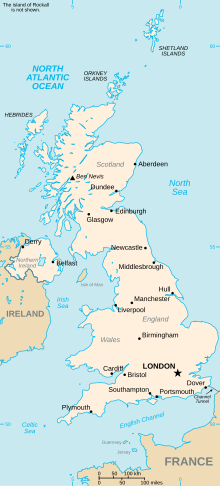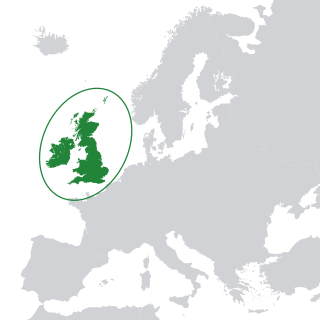
The following is an alphabetical list of articles related to the United Kingdom.

The following is an alphabetical list of articles related to the United Kingdom.




The British Isles are a group of islands in the North Atlantic Ocean off the north-western coast of continental Europe, consisting of the islands of Great Britain, Ireland, the Isle of Man, the Inner and Outer Hebrides, the Northern Isles, and over six thousand smaller islands. They have a total area of 315,159 km2 (121,684 sq mi) and a combined population of almost 72 million, and include two sovereign states, the Republic of Ireland, and the United Kingdom of Great Britain and Northern Ireland. The Channel Islands, off the north coast of France, are normally taken to be part of the British Isles, even though geographically they do not form part of the archipelago. Under the UK Interpretation Act 1978, the Channel Islands are clarified as forming part of the British Islands, not to be confused with the British Isles.
Shire is a traditional term for an administrative division of land in Great Britain and some other English-speaking countries such as Australia and the United States. It is generally synonymous with county. It was first used in Wessex from the beginning of Anglo-Saxon settlement, and spread to most of the rest of England in the tenth century. In some rural parts of Australia, a shire is a local government area; however, in Australia it is not synonymous with a "county", which is a lands administrative division.

The United Kingdom is a sovereign state located off the north-western coast of continental Europe. With a total area of approximately 248,532 square kilometres (95,960 sq mi), the UK occupies the major part of the British Isles archipelago and includes the island of Great Britain, the north-eastern one-sixth of the island of Ireland and many smaller surrounding islands. It is the world's 7th largest island country. The mainland areas lie between latitudes 49°N and 59°N, and longitudes 8°W to 2°E. The Royal Observatory, Greenwich, in south-east London, is the defining point of the Prime Meridian.

Lieutenancy areas, officially counties and areas for the purposes of the lieutenancies, are the separate areas of the United Kingdom appointed a lord-lieutenant – a representative of the British monarch. In many cases they have similar demarcation and naming to, but are not necessarily coterminate with, the counties of the United Kingdom.
Chapman codes are a set of 3-letter codes used in genealogy to identify the administrative divisions in the United Kingdom, Ireland, the Isle of Man and the Channel Islands.
A lord-lieutenant is the British monarch's personal representative in each lieutenancy area of the United Kingdom. Historically, each lieutenant was responsible for organising the county's militia. Lord-lieutenant is now an honorary titular position usually awarded to a retired notable person in the county.

The Central Belt of Scotland is the area of highest population density within Scotland. Depending on the definition used, it has a population of between 2.4 and 4.2 million, including multiple Scottish cities; Greater Glasgow, Ayrshire, Falkirk, Edinburgh, Lothian and Fife.

The terminology of the British Isles refers to the words and phrases that are used to describe the geographical and political areas of the islands of Great Britain, Ireland and the smaller islands which surround them. The terms are often a source of confusion, partly owing to the similarity between some of the actual words used but also because they are often used loosely. Many of the words carry geographical and political connotations which are affected by the history of the islands.
England is divided by a number of different regional schemes for various purposes. Since the creation of the Government Office Regions in 1994 and their adoption for statistical purposes in 1999, some historical regional schemes have become obsolete. However, many alternative regional designations also exist and continue to be widely used.

The New Year Honours 2000 for the United Kingdom and New Zealand were announced on 31 December 1999, to celebrate the year passed and mark the beginning of 2000. The Honours list is a list of people who have been awarded one of the various orders, decorations, and medals of the United Kingdom. Honours are split into classes ("orders") and are graded to distinguish different degrees of achievement or service, most medals are not graded. The awards are presented to the recipient in one of several investiture ceremonies at Buckingham Palace throughout the year by the Sovereign or her designated representative. The Prince of Wales and The Princess Royal deputised for The Queen.

The following outline is provided as an overview of and topical guide to England:

In the United Kingdom, devolution is the Parliament of the United Kingdom's statutory granting of a greater level of self-government to the Scottish Parliament, the Senedd, the Northern Ireland Assembly and the London Assembly and to their associated executive bodies: the Scottish Government, the Welsh Government, the Northern Ireland Executive and in England, the Greater London Authority and combined authorities.